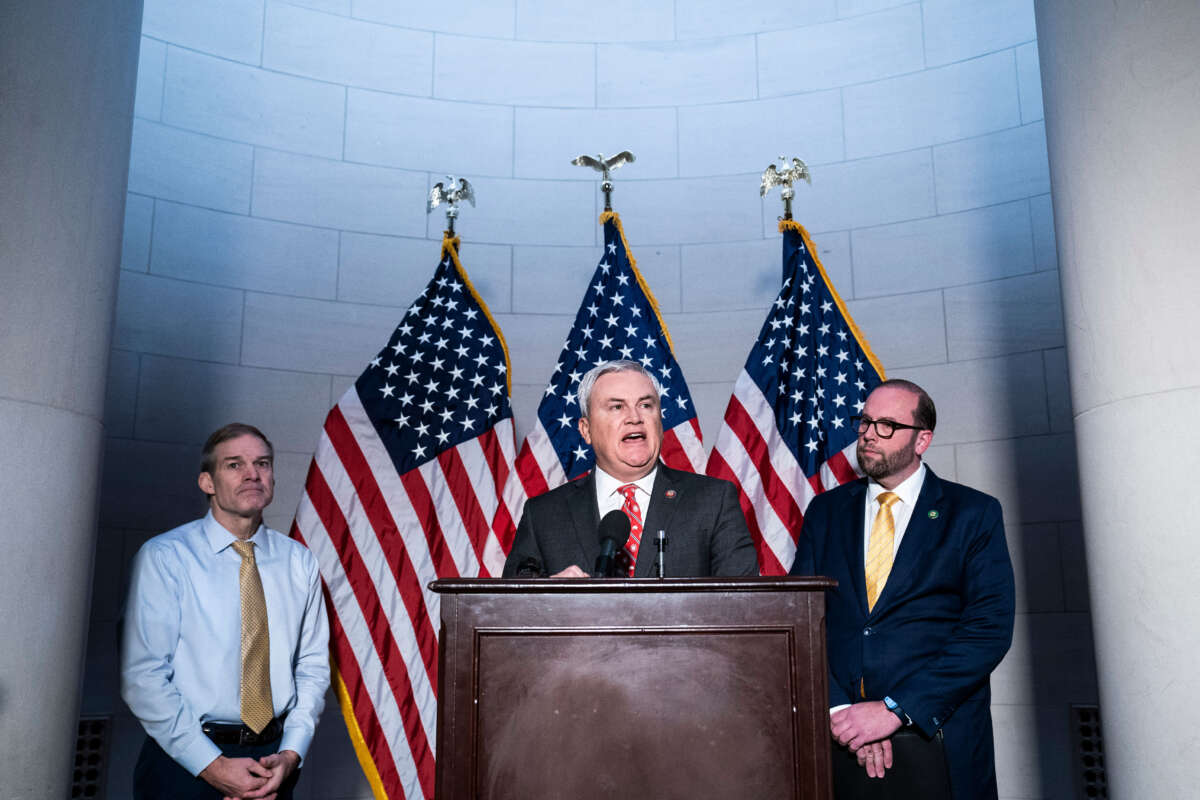Honest, paywall-free news is rare. Please support our boldly independent journalism with a donation of any size.
For the eighth time in history, the U.S. House of Representatives has voted to formalize an impeachment inquiry against a sitting president — this time, citing little compelling evidence.
In a vote that was wholly partisan, 221 Republicans backed a House resolution calling for a formal impeachment inquiry into President Joe Biden. All 212 Democrats in the chamber opposed the measure.
The inquiry was technically launched in September without a full vote, after then-Speaker of the House Kevin McCarthy (R-California) ordered the heads of three House committees to begin investigating Biden over still-unsubstantiated claims that he had aided his son’s business dealings or benefited from them himself as vice president of the Obama administration.
Formalizing the impeachment inquiry gives more political weight to those committees’ future requests for documents, witness testimonies and other evidence-gathering powers.
Impeachment inquiries are rare in American politics, generally occurring only after overwhelming evidence suggests that a president or other executive branch figure has engaged in malfeasance of some kind. However, this inquiry differs vastly from those in the past, as there is no concrete proof to back any of Republicans’ allegations, a point that many within the House GOP conference have readily admitted.
Still, the conference stood together, with all Republican members of the House voting to pass the measure.
Republicans are framing the vote as a procedural move rather than the significant action that it’s been portrayed as in the past, saying the formalized inquiry is needed in order to find evidence of wrongdoing — again, a process that goes in the opposite direction that past impeachment inquiries have gone.
Indeed, a case could be made that much of the evidence that has been gathered so far warrants dropping the inquiry that had already begun. Witnesses who have testified before Republicans, including Hunter Biden’s former business partners, have confirmed that the president didn’t engage in any actions that could be viewed as impeachable. And after viewing around 36,000 bank records belonging to the Bidens, Republicans have not found a “smoking gun” and have relied solely on innuendo to justify continuing their investigation against the president. They have claimed, for example, that loan repayments from Hunter Biden to Joe Biden, in order for the former to purchase a truck, were examples of money laundering from the Chinese government; the only evidence they provided backing that assertion is the fact that the younger Biden earned his income at the time from Chinese companies with connections to Beijing.
Those payments were made to Joe Biden at a time when he wasn’t in any government office.
Nevertheless, Republican lawmakers continue to insist that Biden’s actions are somehow worthy of impeachment, with Rep. James Comer (R-Kentucky), the chair of the House Oversight Committee and leader of the inquiry, stating that Biden “must be held accountable for his lies, corruption and obstruction.”
Notably, Speaker of the House Mike Johnson (R-Louisiana) who brought the vote to the floor on Wednesday, did so on the fourth anniversary of him chastising Democrats for opening an inquiry against former President Donald Trump without any Republican support.
Some Democrats accused their Republican colleagues of only opening an impeachment inquiry against Biden to help Trump in their potential rematch election in 2024.
“We are here for one reason and one reason alone: Donald Trump demanded that Republicans impeach, so they are going to impeach,” Rep. Jim McGovern (D-Massachusetts) said prior to the vote, referring to Trump’s demands in August that GOP lawmakers impeach Biden even without an inquiry. “They are weaponizing and abusing impeachment, one of the most somber and serious things that Congress can do, to attack President Joe Biden.”
Biden has also condemned the vote by Republicans.
“Instead of doing anything to help make Americans’ lives better, [Republicans] are focused on attacking me with lies,” Biden said in his statement. “Instead of doing their job on the urgent work that needs to be done, they are choosing to waste time on this baseless political stunt.”
A terrifying moment. We appeal for your support.
In the last weeks, we have witnessed an authoritarian assault on communities in Minnesota and across the nation.
The need for truthful, grassroots reporting is urgent at this cataclysmic historical moment. Yet, Trump-aligned billionaires and other allies have taken over many legacy media outlets — the culmination of a decades-long campaign to place control of the narrative into the hands of the political right.
We refuse to let Trump’s blatant propaganda machine go unchecked. Untethered to corporate ownership or advertisers, Truthout remains fearless in our reporting and our determination to use journalism as a tool for justice.
But we need your help just to fund our basic expenses. Over 80 percent of Truthout’s funding comes from small individual donations from our community of readers, and over a third of our total budget is supported by recurring monthly donors.
Truthout has launched a fundraiser, and we have a goal to add 200 new monthly donors in the next 24 hours. Whether you can make a small monthly donation or a larger one-time gift, Truthout only works with your support.
